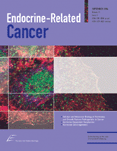| HOME | HELP | FEEDBACK | SUBSCRIPTIONS | ARCHIVE | SEARCH | TABLE OF CONTENTS |
|
|
||||||||
Tenovus Centre for Cancer Research, Welsh School of Pharmacy, Redwood Building, University of Cardiff, King Edward VII Avenue, Cardiff CF10 3XF, UK
1 Dipartimento di Medicina Sperimentale e Diagnostica, Universita di Ferrara, Ferrara, Italy
2 AstraZeneca Pharmaceuticals, Mereside, Alderley Park, Macclesfield, Cheshire, UK
(Requests for offprints should be addressed to H E Jones; Email: joneshe1{at}cardiff.ac.uk)
De novo and acquired resistance to the anti-tumour drug gefitinib (ZD1839; Iressa), a specific epidermal growth factor receptor (EGFR) tyrosine kinase inhibitor (TKI) has been reported. We have determined whether signalling through the IGF-I receptor (IGF-1R) pathway plays a role in the gefitinib-acquired resistance phenotype. Continuous exposure of EGFR-positive MCF-7-derived tamoxifen resistant breast cancer cells (TAM-R) to 1 µM gefitinib resulted in a sustained growth inhibition (90%) for 4 months before the surviving cells resumed proliferation. A stable gefitinib-resistant subline (TAM/TKI-R) was established after a further 2 months and this showed no detectable basal phosphorylated EGFR activity. Compared with the parental TAM-R cells, the TAM/ TKI-R cells demonstrated (a) elevated levels of activated IGF-1R, AKT and protein kinase C (PKC), (b) an increased sensitivity to growth inhibition by the IGF-1R TKI AG1024 and (c) an increased migratory capacity that was reduced by AG1024 treatment. Similarly, the EGFR-positive androgen-independent human prostate cancer cell line DU145 was also continuously challenged with 1 µM gefitinib and, although substantial growth inhibition (60%) was seen initially, a gefitinib-resistant variant (DU145/TKI-R) developed after 3 months. Like their breast cancer counterparts, the DU145/TKI-R cells showed increases in the levels of components of the IGF-1R signalling pathway and an elevated sensitivity to growth inhibition by AG1024 compared with the parent DU145 cell line. Additionally, DU145/TKI-R cell migration was also decreased by this inhibitor. We have therefore concluded that in breast and prostate cancer cells acquired resistance to gefitinib is associated with increased signalling via the IGF-1R pathway, which also plays a role in the invasive capacity of the gefitinib-resistant phenotype.
This article has been cited by other articles: (Search Google Scholar for Other Citing Articles)
 |
F. Cappuzzo, L. Toschi, G. Tallini, G. L. Ceresoli, I. Domenichini, S. Bartolini, G. Finocchiaro, E. Magrini, G. Metro, A. Cancellieri, R. Trisolini, L. Crino, P. A. Bunn Jr, A. Santoro, W. A. Franklin, M. Varella-Garcia, and F. R. Hirsch Insulin-like growth factor receptor 1 (IGFR-1) is significantly associated with longer survival in non-small-cell lung cancer patients treated with gefitinib Ann. Onc., July 1, 2006; 17(7): 1120 - 1127. [Abstract] [Full Text] [PDF] |
||||
 |
S. Glaros, N. Atanaskova, C. Zhao, D. F. Skafar, and K. B. Reddy Activation Function-1 Domain of Estrogen Receptor Regulates the Agonistic and Antagonistic Actions of Tamoxifen Mol. Endocrinol., May 1, 2006; 20(5): 996 - 1008. [Abstract] [Full Text] [PDF] |
||||
 |
M. Mimeault and S. K. Batra Recent advances on multiple tumorigenic cascades involved in prostatic cancer progression and targeting therapies Carcinogenesis, January 1, 2006; 27(1): 1 - 22. [Abstract] [Full Text] [PDF] |
||||
 |
C Festuccia, P Muzi, D Millimaggi, L Biordi, G L Gravina, S Speca, A Angelucci, V Dolo, C Vicentini, and M Bologna Molecular aspects of gefitinib antiproliferative and pro-apoptotic effects in PTEN-positive and PTEN-negative prostate cancer cell lines Endocr. Relat. Cancer, December 1, 2005; 12(4): 983 - 998. [Abstract] [Full Text] [PDF] |
||||
 |
J. M. Knowlden, I. R. Hutcheson, D. Barrow, J. M. W. Gee, and R. I. Nicholson Insulin-Like Growth Factor-I Receptor Signaling in Tamoxifen-Resistant Breast Cancer: A Supporting Role to the Epidermal Growth Factor Receptor Endocrinology, November 1, 2005; 146(11): 4609 - 4618. [Abstract] [Full Text] [PDF] |
||||
 |
R. Bianco, T. Troiani, G. Tortora, and F. Ciardiello Intrinsic and acquired resistance to EGFR inhibitors in human cancer therapy Endocr. Relat. Cancer, July 1, 2005; 12(Supplement_1): S159 - S171. [Abstract] [Full Text] [PDF] |
||||
 |
R I Nicholson, I R Hutcheson, S E Hiscox, J M Knowlden, M Giles, D Barrow, and J M W Gee Growth factor signalling and resistance to selective oestrogen receptor modulators and pure anti-oestrogens: the use of anti-growth factor therapies to treat or delay endocrine resistance in breast cancer Endocr. Relat. Cancer, July 1, 2005; 12(Supplement_1): S29 - S36. [Abstract] [Full Text] [PDF] |
||||
| HOME | HELP | FEEDBACK | SUBSCRIPTIONS | ARCHIVE | SEARCH | TABLE OF CONTENTS |